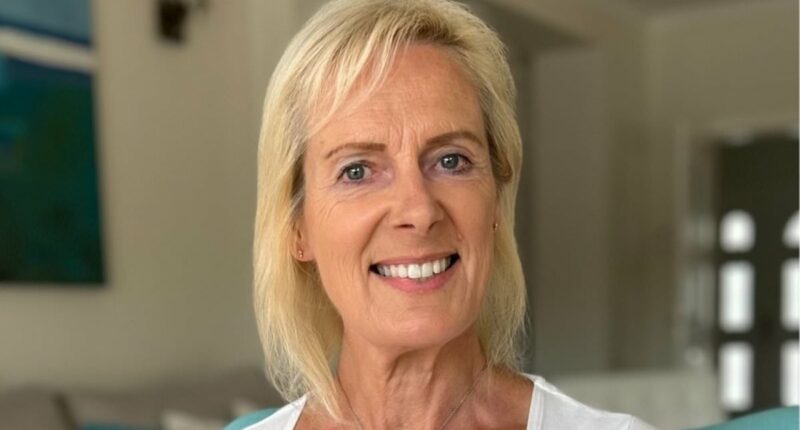Share this @internewscast.com
Once every week, while her husband is deep asleep, 52-year-old Sarah Moore quietly makes her way downstairs to the kitchen, opens the fridge, and reaches into the salad drawer.
Feeling around beneath the lettuce and cucumber, she retrieves a small injector pen. Making use of the dim light from the kitchen oven, she administers an injection to herself.
Despite this secrecy, Sarah’s injections are not illegal drugs – she’s actually using a weight-loss shot – yet she is keen for her husband to remain unaware.
Using a pseudonym for privacy, Sarah explains: ‘I haven’t informed my husband because he believes using Mounjaro is cheating. He argues that weight loss should come from gym efforts or strict dieting.
‘I simply tell him that’s the method I’m using to lose weight.’ Initially weighing 16st 7lb, Sarah has shed a stone in three months, aiming to reach 12st.
‘He seems perfectly happy my clothes are loose and I feel more confident so what he doesn’t know won’t hurt him,’ she adds. ‘It’s only a white lie…’
Sarah isn’t alone in this approach. A visit to any online support platform for weight-loss jabs reveals many women – the majority being women – discussing how they conceal their use of weight-loss injections from their partners, who remain unaware of the true reason for their weight loss.
For some, like Sarah, they do so because their partners don’t agree with the principle of using fat jabs for weight loss.
And for others, such as Mandy Palmer, 47, it’s because they want to avoid constant conversations about the jabs’ safety, as their partners have voiced concerns about the side-effects.
Mandy, also speaking to the Mail on the condition of using a pseudonym, says she’s keeping her husband of 20 years in the dark about how she is shedding weight because ‘I know he’d complain that it’s dangerous or might have bad health side-effects’.

There is an emotional toll when keeping the weight-loss jab secret, says Dr Rose Aghdami, from the British Psychological Society
’I just don’t want him reeling off reasons why I shouldn’t be on it and the over-the-top health concerns – when in truth, I have never felt better.’
She has been using Mounjaro since January and has lost 3st in that time.
‘He has been congratulating me on my willpower,’ she admits. ‘I know I’m taking false credit for dieting and working out when I am actually taking Mounjaro – but there are worse lies you can tell a partner.’
But experts warn there may be psychological and physical dangers in keeping the use of weight-loss jabs a secret.
Zaher Toumi, a consultant laparoscopic and bariatric surgeon at the Spire Hospital Washington, explains: ‘Non-disclosure is frequently driven by weight stigma.
‘Obesity remains widely misunderstood, often mischaracterised as a matter of poor self-control rather than recognised as a chronic, relapsing disease of excess adiposity [i.e. fat tissue] with complex causes.
He says these misconceptions ‘perpetuate’ the prejudice of others – and compound the person’s own feelings of stigma, so they view their condition as a personal failing.
‘These factors can act as significant barriers to open discussion with healthcare professionals – and to family members.’
He adds that this phenomenon is not only seen in those taking anti-obesity medications – even those who have undergone bariatric surgery such as gastric bypass don’t always tell family members or their GP.
Yet in each case, telling your nearest and dearest – as well as your GP – is vital in case you experience a serious side-effect, he says.
‘This is particularly important for anti-obesity agents such as Mounjaro, which are most often initiated in private practice,’ Mr Toumi told the Mail.
‘Families who are unaware of a loved one being on a treatment may misinterpret their symptoms, causing unnecessary stress and panic, for instance.
‘But more importantly, awareness of the weight-loss jab enables family members to better understand what the patient is going through and provide timely help should complications arise.’
And it’s not just recognising specific changes – such as their desire to eat smaller portions – or side-effects such as nausea: particularly worrying are potential complications such as gallstones or pancreatitis, a rare but potentially life-threatening inflammation of the pancreas. These can cause severe abdominal pain, for instance, but must be recognised early in order to be treated successfully.
Adding to the problem, some private prescribing services don’t notify GPs when patients start weight-loss treatment.

Some women keep it secret because their partners don’t agree with the principle of using fat jabs for weight loss (file image)
The risk here is that obesity drugs such as Mounjaro can interact with different medications – such as the contraceptive pill, blood thinners like warfarin, or heart drugs including digoxin – as the jabs all work by slowing stomach emptying, which in turn can affect medication absorption.
That means that without disclosure to their GP, patients put themselves at risk of not being on the correct dose should they require other medical treatment – potentially risking unintended pregnancy or dangerous changes in blood clotting and heart rhythm.
‘Optimal treatment requires open communication across all healthcare providers,’ Mr Toumi stresses. ‘Full disclosure of all medications – wherever they’re prescribed – is essential to protect patients and ensure safe, effective care.’
Then there is the emotional toll of keeping the weight-loss jab secret, explains Dr Rose Aghdami, from the British Psychological Society.
‘There is a danger that some partners might feel hurt after finding out,’ she told the Mail. ‘There is scope for partners to feel like they’ve been excluded from something important in their partner’s life – particularly if they do experience long-term or bad side-effects.
‘They may feel that they could have supported and that that support has been rejected.
‘They could feel deceived and their trust in the partner could feel betrayed – because it’s quite a big decision to make alone.’
She adds: ‘Also until the family member finds out, if they notice weight being lost, it could cause the anxiety because in many cases sudden weight loss is a sign of an illness – even cancer – so it could cause unnecessary worry.’
As to why women are more likely to lie to their partners about using weight-loss jabs, as well as their feelings of stigma, Rose Aghdami suggests: ‘It could also be a fear of failure that they perhaps don’t yet know how well it will work for them so they perhaps prefer to do it in secret so they don’t have to be accountable for anything.
‘Also it could be just keeping a sense of privacy about their physical health and body.
‘It could also be that people want to feel as though they can take charge of their experience so if there are any ups and downs they’re not necessarily going to have to share that with a partner, they can deal with it without having a feeling of being monitored.’
Sarah does not worry about such things, saying: ‘I really don’t consider this lying – like having an affair or depleting the family finances would be for example.
‘It’s just keeping a tiny secret and I don’t see why my husband would be deeply wounded if he ever found out. I don’t plan to tell him – although maybe once I hit my goal weight. I am not sure yet.’
Mandy agrees: ‘I like the respect I am getting from my husband for working so hard to lose weight and worry what he’d say if he knew I was “cheating” by using weight-loss jabs.
‘Some women keep all sorts of secrets from their husbands that are worse than this. I don’t see the problem.’

















